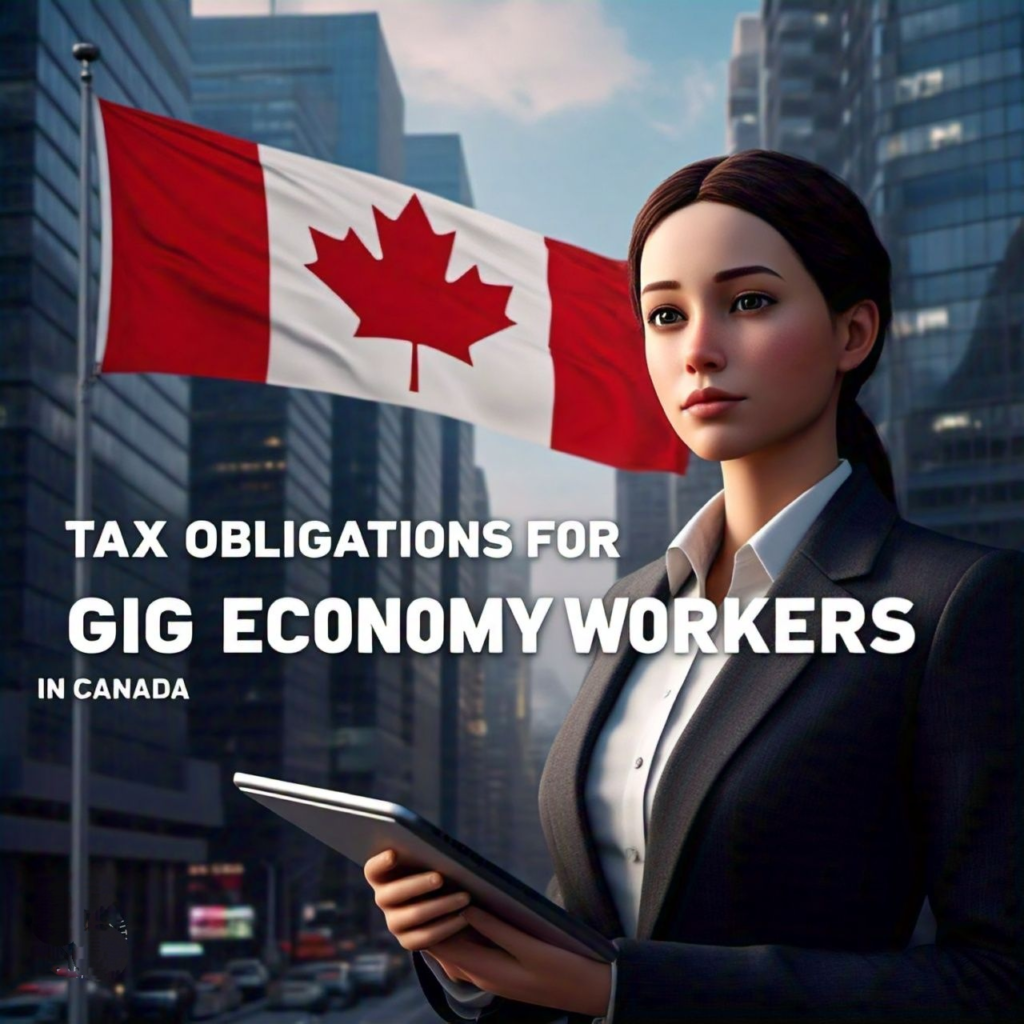MAXIMIZE YOUR EARNINGS: 5 EXPERT TAX TIPS FOR THE THRIVING GIG ECONOMY WORKFORCE
As a gig economy worker in Canada, navigating the complex world of taxes can be overwhelming. With the rise of freelance, contract, and part-time work, it’s essential to understand how to maximize your earnings and minimize your tax liability. In this article, we’ll provide expert tax tips and advice from a Canada tax expert and financial advisor in Ontario.
UNDERSTANDING THE GIG ECONOMY AND TAXES
The gig economy has transformed the way people work, with millions of Canadians earning income through non-traditional means. However, this shift has also created new tax challenges. Unlike traditional employees, gig economy workers are responsible for their own tax obligations, including income tax, CPP, and EI.
EXPERT TAX TIPS FOR GIG ECONOMY WORKERS

1. Register for a GST/HST Account: If you earn more than $30,000 in a calendar quarter, you may need to register for a GST/HST account. This can help you claim input tax credits and reduce your tax liability.
2. Claim Business Expenses: As a gig economy worker, you can claim business expenses on your tax return. This includes expenses such as home office expenses, travel costs, and equipment purchases.
3. Take Advantage of Tax Credits: There are several tax credits available to gig economy workers, including the Basic Personal Amount, the Spousal Amount, and the Child Fitness Tax Credit.
4. Consider Incorporating: Incorporating your business can provide tax benefits, including reduced tax rates and increased access to small business deductions.
5. Seek Professional Advice: As a gig economy worker, it’s essential to seek professional advice from a Canada tax expert or financial advisor in Ontario. They can help you navigate the complex world of taxes and ensure you’re taking advantage of all the tax savings available to you.
TAX OBLIGATIONS FOR GIG ECONOMY WORKERS IN CANADA (INCOME TAX, CPPI, EI)

INCOME TAX OBLIGATIONS
1. Self-Employment Income: Gig economy workers are considered self-employed and must report their income on their tax return.
2. Business Income: Income earned from freelancing, consulting, or other business activities is considered business income and must be reported on the tax return.
3. Taxable Income: Gig economy workers must calculate their taxable income by subtracting business expenses from their gross income.
CANADA PENSION PLAN (CPP) OBLIGATIONS
1. Self-Employment CPP Contributions: Gig economy workers must make CPP contributions on their self-employment income.
2. CPP Contribution Rates: The CPP contribution rate is 9.9% of earnings between $3,500 and $64,900 (2024 rates).
3. CPP Payment Schedule: CPP contributions are due by April 30th of each year.
EMPLOYMENT INSURANCE (EI) OBLIGATIONS
1. EI Premiums: Gig economy workers are not required to pay EI premiums, unless they opt-in to the EI program.
2. EI Benefits: Gig economy workers may be eligible for EI benefits, such as maternity or parental benefits, if they have paid EI premiums.
OTHER TAX OBLIGATIONS
1. GST/HST Registration: Gig economy workers may need to register for a GST/HST account if their annual revenue exceeds $30,000.
2. Business Expenses: Gig economy workers can claim business expenses on their tax return to reduce their taxable income.
3. Tax Credits: Gig economy workers may be eligible for tax credits, such as the Basic Personal Amount or the Spousal Amount.
TAX FILING REQUIREMENTS
1. T1 General Form: Gig economy workers must file their tax return using the T1 General form.
2. Statement of Business or Professional Activities: Gig economy workers must complete the Statement of Business or Professional Activities (Form T2125) to report their business income and expenses.
3. Tax Filing Deadline: The tax filing deadline is April 30th of each year.
PENALTIES FOR NON-COMPLIANCE
1. Late Filing Penalty: A penalty of 5% of the balance owing, plus 1% of the balance owing for each full month that the return is late.
2. Late Payment Penalty: A penalty of 3% of the balance owing, plus 1% of the balance owing for each full month that the payment is late.
3. Interest Charges: Interest charges on outstanding balances.
COMMON MISTAKES MADE BY GIG ECONOMY WORKERS

Here are some common mistakes made by gig economy workers:
I. Tax-Related Mistakes
1. Failure To Register For A GST/HST Account: Not registering for a GST/HST account when required can result in penalties and fines.
2. Not Reporting All Income: Failing to report all income earned, including tips and gratuities, can lead to audits and penalties.
3. Not Claiming Business Expenses: Failing to claim eligible business expenses can result in missed tax savings.
4. Not Keeping Accurate Records: Poor record-keeping can lead to missed deductions, penalties, and audits.
II. Financial Planning Mistakes
1. Not Setting Aside Funds For Taxes: Failing to set aside funds for taxes can lead to a large tax bill at the end of the year.
2. Not Budgeting For Benefits: Not budgeting for benefits, such as health and dental insurance, can lead to financial strain.
3. Not Planning For Retirement: Not planning for retirement can lead to financial insecurity in the future.
4. Not Having An Emergency Fund: Not having an emergency fund can lead to financial strain in the event of an unexpected expense.
III. Business Operations Mistakes
1. Not Having A Clear Contract: Not having a clear contract can lead to misunderstandings and disputes with clients.
2. Not Setting Clear Boundaries: Not setting clear boundaries can lead to burnout and blurred lines between work and personal life.
3. Not Prioritizing Self-care: Not prioritizing self-care can lead to burnout and decreased productivity.
4. Not Staying Organized: Not staying organized can lead to missed deadlines, lost documents, and decreased productivity.
IV. Insurance and Benefits Mistakes
1. Not Having Liability Insurance: Not having liability insurance can leave gig economy workers vulnerable to lawsuits and financial losses.
2. Not Having Health And Dental Insurance: Not having health and dental insurance can lead to financial strain in the event of a medical emergency.
3. Not Having Disability Insurance: Not having disability insurance can leave gig economy workers vulnerable to financial losses in the event of an injury or illness.
4. Not Having Life Insurance: Not having life insurance can leave gig economy workers’ loved ones vulnerable to financial losses in the event of their passing.
V. RETIREMENT PLANNING MISTAKES
1. Not Contributing To A Retirement Account: Not contributing to a retirement account can lead to financial insecurity in retirement.
2. Not Taking Advantage Of Tax-Advantaged Retirement Accounts: Not taking advantage of tax-advantaged retirement accounts, such as RRSPs and TFSAs, can lead to missed tax savings.
3. Not Diversifying Retirement Investments: Not diversifying retirement investments can lead to financial risk and decreased returns.
4. Not Seeking Professional Advice: Not seeking professional advice can lead to poor retirement planning decisions and financial insecurity.
By being aware of these common mistakes, gig economy workers can take steps to avoid them and ensure financial stability and security.
FREQUENTLY ASKED QUESTIONS
Here are some frequently asked questions:
General Tax Questions
1. What is the deadline for filing my tax return as a gig economy worker? The deadline for filing your tax return is April 30th of each year.
2. Do I need to file a tax return if I earned less than $10,000? Yes, you are required to file a tax return if you earned more than $1,000 in self-employment income.
3. Can I file my tax return electronically? Yes, you can file your tax return electronically using certified tax software.
Business Expenses and Deductions
1. What business expenses can I claim as a gig economy worker? You can claim expenses such as home office expenses, travel costs, equipment purchases, and professional fees.
2. How do I calculate my home office expenses? You can calculate your home office expenses using the simplified method, which is $5 per square foot of home office space, up to a maximum of $1,000.
3. Can I claim my car expenses as a business deduction? Yes, you can claim your car expenses as a business deduction, but you must keep a logbook to track your business kilometers.
GST/HST and PST
1. Do I need to register for a GST/HST account? You need to register for a GST/HST account if you earn more than $30,000 in a calendar quarter.
2. How do I charge GST/HST to my clients? You charge GST/HST to your clients based on the province where they reside.
3. Do I need to collect PST? You need to collect PST if you sell taxable goods or services in a province that has a provincial sales tax.
Tax Credits and Benefits
1. What tax credits are available to gig economy workers? Tax credits available to gig economy workers include the Basic Personal Amount, the Spousal Amount, and the Child Fitness Tax Credit.
2. Can I claim the Canada Pension Plan (CPP) contributions I made? Yes, you can claim the CPP contributions you made as a tax deduction.
3. Am I eligible for Employment Insurance (EI) benefits? You may be eligible for EI benefits if you have paid EI premiums and meet the eligibility requirements.
Record Keeping and Audits
1. What records do I need to keep as a gig economy worker? You need to keep records of your income, expenses, and business-related activities.
2. How long do I need to keep my records? You need to keep your records for at least six years in case of an audit.
3. What happens if I get audited? If you get audited, you will need to provide supporting documentation for your income and expenses, and you may need to pay additional taxes or penalties.
Consulting a Tax Professional
1. Do I need to consult a tax professional? It is recommended that you consult a tax professional to ensure you are taking advantage of all the tax savings available to you.
2. How do I find a qualified tax professional? You can find a qualified tax professional by asking for referrals, checking with professional associations, or searching online.
3. What questions should I ask a tax professional? You should ask a tax professional about their experience working with gig economy workers, their knowledge of tax laws and regulations, and their fees and services.
THINGS TO AVOID WHEN MAXIMIZING YOUR EARNINGS
Here are some things to avoid when it comes to maximizing your earnings as a gig economy worker:
I. Tax-Related Mistakes
1. Not registering for a GST/HST account: Failing to register for a GST/HST account when required can result in penalties and fines.
2. Not reporting all income: Failing to report all income earned, including tips and gratuities, can lead to audits and penalties.
3. Not claiming business expenses: Failing to claim eligible business expenses can result in missed tax savings.
4. Not keeping accurate records: Poor record-keeping can lead to missed deductions, penalties, and audits.
II. Financial Planning Mistakes
1. Not setting aside funds for taxes: Failing to set aside funds for taxes can lead to a large tax bill at the end of the year.
2. Not budgeting for benefits: Not budgeting for benefits, such as health and dental insurance, can lead to financial strain.
3. Not planning for retirement: Not planning for retirement can lead to financial insecurity in the future.
4. Not having an emergency fund: Not having an emergency fund can lead to financial strain in the event of an unexpected expense.
III. Business Operations Mistakes
1. Not having a clear contract: Not having a clear contract can lead to misunderstandings and disputes with clients.
2. Not setting clear boundaries: Not setting clear boundaries can lead to burnout and blurred lines between work and personal life.
3. Not prioritizing self-care: Not prioritizing self-care can lead to burnout and decreased productivity.
4. Not staying organized: Not staying organized can lead to missed deadlines, lost documents, and decreased productivity.
IV. Insurance and Benefits Mistakes
1. Not having liability insurance: Not having liability insurance can leave gig economy workers vulnerable to lawsuits and financial losses.
2. Not having health and dental insurance: Not having health and dental insurance can lead to financial strain in the event of a medical emergency.
3. Not having disability insurance: Not having disability insurance can leave gig economy workers vulnerable to financial losses in the event of an injury or illness.
4. Not having life insurance: Not having life insurance can leave gig economy workers’ loved ones vulnerable to financial losses in the event of their passing.
V. Retirement Planning Mistakes
1. Not contributing to a retirement account: Not contributing to a retirement account can lead to financial insecurity in retirement.
2. Not taking advantage of tax-advantaged retirement accounts: Not taking advantage of tax-advantaged retirement accounts, such as RRSPs and TFSAs, can lead to missed tax savings.
3. Not diversifying retirement investments: Not diversifying retirement investments can lead to financial risk and decreased returns.
4. Not seeking professional advice: Not seeking professional advice can lead to poor retirement planning decisions and financial insecurity.
VI. Other Mistakes
1. Not staying up-to-date with tax laws and regulations: Not staying up-to-date with tax laws and regulations can lead to missed tax savings and penalties.
2. Not seeking professional advice: Not seeking professional advice can lead to poor financial planning decisions and financial insecurity.
3. Not having a long-term financial plan: Not having a long-term financial plan can lead to financial insecurity and decreased earnings.
4. Not monitoring finances regularly: Not monitoring finances regularly can lead to financial strain and decreased earnings.
CONCLUSION
In conclusion, maximizing earnings as a gig economy worker requires a solid understanding of tax laws and regulations. By following the expert tax tips outlined in this article, gig economy workers can minimize their tax liability, maximize their earnings, and achieve financial stability.
Key takeaways from this article include:
– Registering for a GST/HST account to claim input tax credits
– Claiming business expenses to reduce taxable income
– Taking advantage of tax credits, such as the Basic Personal Amount and the Spousal Amount
– Considering incorporation to reduce tax liability
– Seeking professional advice from a tax expert or a financial advisor
By implementing these tax tips and strategies, gig economy workers can:
– Increase their earnings and take home pay
– Reduce their tax liability and minimize audits
– Achieve financial stability and security
– Grow their business and increase their financial opportunities
Remember, tax laws and regulations are constantly changing, so it’s essential to stay up-to-date and seek professional advice to ensure you’re taking advantage of all the tax savings available to you.
CALL TO ACTION
Book a consultation with our tax expert and financial advisor today at [email protected] to learn more about how you can maximize your earnings and achieve financial stability as a gig economy worker.
FINAL THOUGHTS
As a gig economy worker, you have the power to take control of your finances and maximize your earnings. By following the expert tax tips outlined in this article, you can achieve financial stability, security, and success.
ABOUT AUTHOR
Shanel John is a dedicated Certified Public Accountant (CPA) at G.L.H. Accounting, specializing in Income Tax with 10 years of experience. Based in Brampton, Ontario, Canada, Shanel offers expertise in tax preparation, financial accounting, and advisory services. A certified QBO Pro Advisor, Shanel’s decade-long experience and knowledge make her a trusted figure in the accounting field.
ADDITIONAL RESOURCES
CANADA REVENUE AGENCY:
https://www.canada.ca/en/revenue-agency.html
GST/HST:
CANADA PENSION PLAN:
https://www.canada.ca/en/services/benefits/publicpensions/cpp/cpp-benefit/apply.html
EMPLOYMENT INSURANCE:
https://www.canada.ca/en/services/benefits/ei/earnings-chart.html

